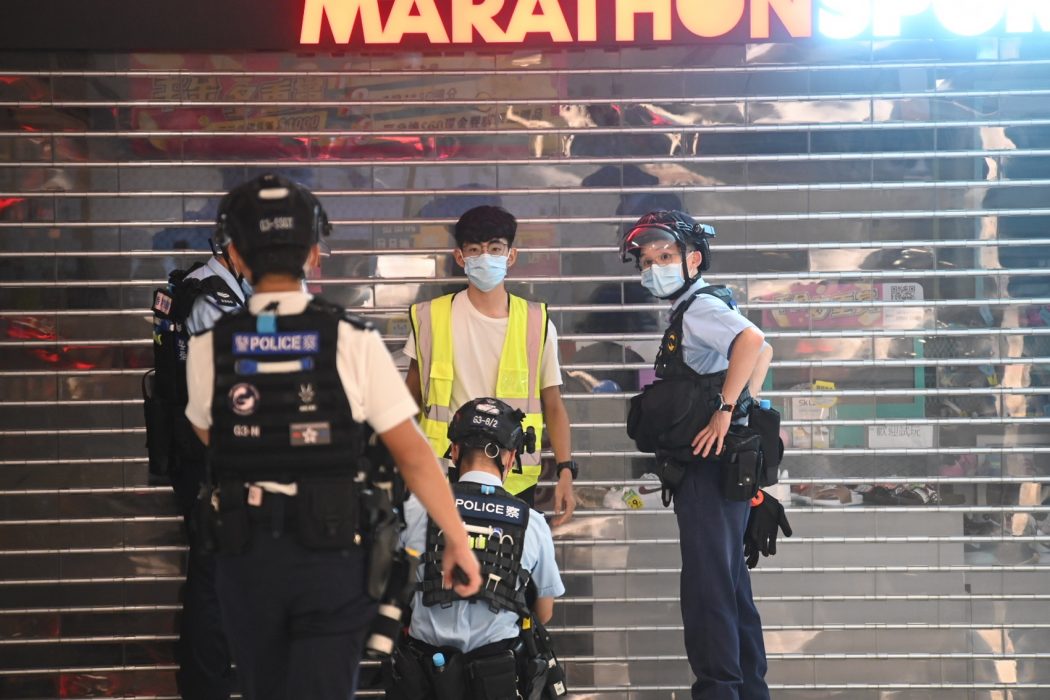Dozens gathered at Hong Kong shopping malls on Tuesday evening to protest in favour of press freedom after around 200 police raided the Apple Daily newsroom and arrested its owner under the national security law.
Netizens called upon citizens over Telegram messenger to gather at four malls for a sing-along demonstration.

On Monday, police arrested ten pro-democracy figures and news executives – including Next Media owner Jimmy Lai. Each were accused of committing offences under the controversial national security law including “collusion” with foreign forces.

Hongkongers gathered at Langham Place in Mong Kok, New Town Plaza in Sha Tin, Times Square in Causeway Bay and Tuen Mun Town Plaza to chant slogans in support of press freedom such as “freedom be with me with an Apple a day.”

Some of them wielded blank protest placards, whilst others carried copies of the pro-democracy newspaper.
The tabloid printed at least 550,000 copies on the day amid mass purchases.

In Mong Kok, a student reporter from PolyU Editorial Board was pushed to the floor by the police as officers conducted stop-and-search actions among the crowd. Police issued penalty tickets to him for violating Covid-19 social distancing rules. Others were also fined after police said they were not “proper journalists.”

The force also raised a purple flag to warn the crowd that they may be chanting slogans or displaying materials that are in contravention of the national security law.
In June 2020, Beijing inserted national security legislation directly into Hong Kong’s mini-constitution – bypassing the local legislature – following a year of pro-democracy protests and unrest. It criminalised subversion, secession, collusion with foreign forces and terrorist acts, which were broadly defined to include disruption to transport and other infrastructure. The move gave police sweeping new powers, alarming democrats, civil society groups and trade partners, as such laws have been used broadly to silence and punish dissidents in China. However, the authorities say it has restored stability and peace to the city.

In a late night statement, police said crowds in Mong Kok and Sha Tin were taking part in an unauthorised assembly and may have committed offences under group gatherings ban: “Police strongly condemn such irresponsible actions that endangered public health. Police have zero tolerance towards illegal acts and will take enforcement action resolutely.”
Sha Tin
In Sha Tin, police media liaison officers ordered reporters at New Town Plaza to prove their identity as “verified journalists,” selecting which would be allowed to document the demonstrations “professionally, macroscopically and with multiple perspectives” outside a cordoned-off area, Stand News reported.

According to InMedia, a Chormediahk reporter was requested by police to show her employment contract with the online news site as they asked if the outlet was on the list of companies registry.
In a statement released on Wednesday, the Hong Kong Journalists Association strongly condemned the police, who they accuse of abusing their powers and interfering with reporting: “Lately the force has taken the initiative to define ‘journalists’ in order to interfere with media reporting. The HKJA urges the government to stop dodging… police brutality issues, or else it will be hard to maintain Hong Kong core values such as freedom and the rule of law.”
Hong Kong does not have any media accreditation system, nor is a licence needed for reporting. At the height of last year’s city-wide protests that erupted over an ill-fated extradition bill, Chief Executive Carrie Lam said the government had no intention of vetting journalists: “We have no intention or plan to start a centralised registration system for journalists, not to mention doing any vetting on who can conduct reporting.”
Support HKFP | Policies & Ethics | Error/typo? | Contact Us | Newsletter | Transparency & Annual Report | Apps
Help safeguard press freedom & keep HKFP free for all readers by supporting our team
























